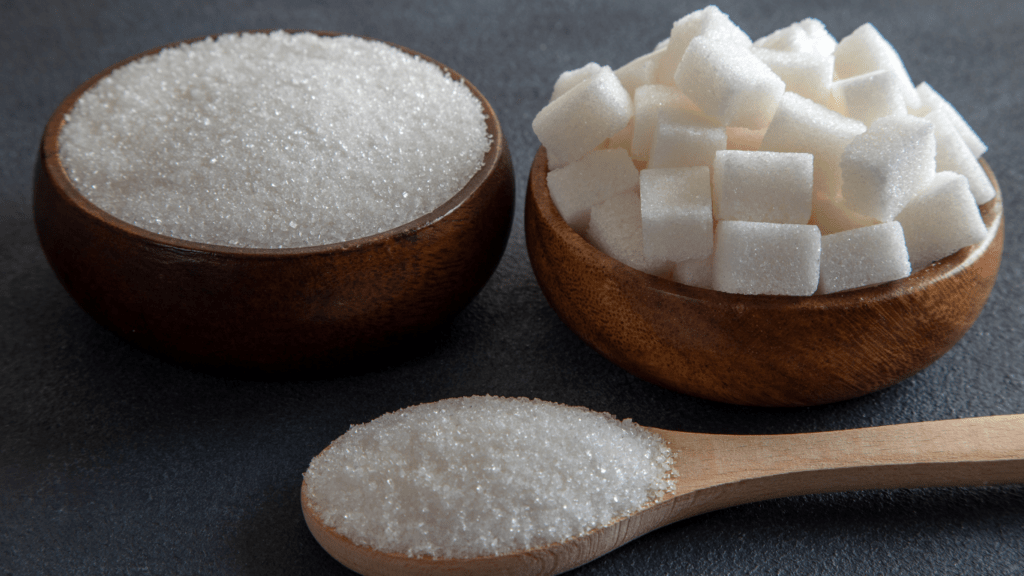Understanding Sugar and Its Types
Sugar, as a carbohydrate, plays a significant role in the body’s energy production. There are varying types of sugar that impact health differently.
Natural vs. Added Sugars
Natural sugars, such as glucose and fructose, occur in whole foods like fruits and vegetables. These sugars offer nutrients and fiber, aiding digestion and gradual energy release. Added sugars, found in processed foods, sweeten and preserve but contribute no nutritional benefits. Excessive consumption increases risks of health issues like obesity and tooth decay, since added sugars are metabolized differently.
Common Sources of Added Sugars
Added sugars are pervasive in many everyday products. Regular favorites include soft drinks, candies, and baked goods, which often contain high fructose corn syrup and cane sugar. Less obvious sources include salad dressings, barbecue sauces, and breakfast cereals. These hidden sugars contribute significantly to average daily intake, making it essential to read labels and be aware of content.
The Impact of Sugar on Your Body

Excessive sugar consumption affects health significantly. It influences body weight, heart health, and diabetes risk.
Effects on Weight and Obesity
High sugar intake contributes to weight gain and obesity. Sugary foods and drinks add calories without making you feel full, so they’re easily consumed in large quantities. For example, a 12-ounce soda contains about 150 calories, all from sugar. The body stores unused calories as fat, increasing obesity risk.
Influence on Heart Health
Sugar affects heart health negatively. High added sugar intake links to higher heart disease risk, according to a study published in JAMA Internal Medicine. Sugar increases inflammation, blood pressure, and triglyceride levels—all contributing to heart disease. Replacing sugary snacks with fruits can improve these risk factors significantly.
Sugar and Diabetes Risk
Consuming too much sugar heightens diabetes risk. Excess sugar stresses the pancreas, which produces insulin, leading to insulin resistance over time. The American Diabetes Association notes this resistance is a precursor to Type 2 diabetes. Reducing sugar intake helps regulate blood sugar levels and supports insulin function.
Psychological and Behavioral Effects
Excessive sugar consumption doesn’t just impact physical health; it also influences mood and behavior. Understanding these effects is crucial for making informed dietary choices.
Impact on Mood and Cognition
Consuming high amounts of sugar can lead to mood swings and cognitive difficulties. Elevated sugar intake often results in an initial energy surge followed by a crash, causing irritability and fatigue. According to research, diets high in added sugars can increase the risk of depression in both adults and children. Additionally, sugar floods the brain with dopamine, creating short-term euphoria but potentially impairing memory and cognitive function over time when consumed persistently in excess.
Sugar’s Role in Addiction
Sugar can be addictive, triggering the brain’s reward system in a manner similar to addictive substances. Regular consumption can lead to cravings and loss of control over intake, as it alters brain chemistry by releasing dopamine, the neurotransmitter associated with pleasure and reward. Studies have shown that sugar dependency can mirror the compulsive behavior seen in drug addiction. Reducing sugar consumption can help alleviate these addictive patterns and restore healthy brain function.
How to Cut Back on Sugar
Cutting back on sugar promotes a healthier lifestyle and reduces health risks. Learning to identify hidden sugars and adopting practical tips supports this goal.
Identifying Hidden Sugars in Your Diet
Reading labels is crucial for uncovering hidden sugars. Many processed foods contain added sugars disguised under different names. By recognizing terms like sucrose, fructose syrup, and maltose, I can pinpoint hidden sugars in sauces, yogurts, or bread. Fresh whole foods usually have fewer added sugars, so opting for them helps manage sugar intake.
Practical Tips for Reducing Sugar Intake
Swapping high-sugar foods for healthier alternatives is an effective strategy.
- I choose fruits to satisfy sweet cravings, as they provide natural sweetness and essential nutrients.
- Lowering sugar in beverages makes a significant impact, so I switch soda and sweetened juices for water or herbal teas.
- Gradually reducing sugar in recipes by a third makes adaptations gentler.
- Experimenting with spices like cinnamon or nutmeg also enhances flavor without adding sugar.
Benefits of Reducing Sugar Consumption
Cutting back on sugar offers multiple health advantages, impacting both physical and mental well-being. Limiting sugar intake can significantly improve energy levels and overall health.
Improved Energy Levels
Reducing sugar intake helps stabilize energy throughout the day. When I consume less sugar, my blood sugar levels avoid sharp spikes and crashes, known contributors to fatigue and sluggishness. This stability allows for more consistent energy, improving focus and productivity in daily activities. Eating balanced meals that include whole grains and proteins supports this steady energy flow.
Better Overall Health
- Lower sugar consumption contributes to stronger heart health and weight management.
- Without excess sugar, my risk for heart disease decreases due to balanced blood pressure and reduced inflammation.
- Managing sugar intake also aids in maintaining a healthy weight, as I consume fewer empty calories and feel fuller from nutrient-dense foods.
By opting for nutritious alternatives, I enhance my body’s overall function and potentially extend my lifespan through improved dietary habits..


 Senior Sports Writer
Alfred Alder is the senior sports writer at Sprint Scoop News, bringing his extensive knowledge of fitness, training, and sports business to the forefront. With a career spanning more than a decade, Alfred specializes in delivering high-quality, engaging content that covers everything from sponsorship trends to the latest in health and nutrition for athletes. His deep understanding of the sports industry allows him to provide readers with comprehensive insights that make complex topics accessible and exciting.
Senior Sports Writer
Alfred Alder is the senior sports writer at Sprint Scoop News, bringing his extensive knowledge of fitness, training, and sports business to the forefront. With a career spanning more than a decade, Alfred specializes in delivering high-quality, engaging content that covers everything from sponsorship trends to the latest in health and nutrition for athletes. His deep understanding of the sports industry allows him to provide readers with comprehensive insights that make complex topics accessible and exciting.
